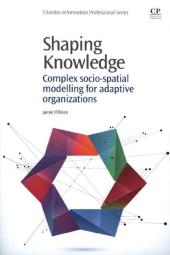 Neuerscheinungen 2014Stand: 2020-02-01 |
Schnellsuche
ISBN/Stichwort/Autor
|
Herderstraße 10
10625 Berlin
Tel.: 030 315 714 16
Fax 030 315 714 14
info@buchspektrum.de |

Jamie O´Brien
Shaping Knowledge
Complex Socio-Spatial Modelling for Adaptive Organizations
2014. 284 S. 235 mm
Verlag/Jahr: CHANDOS 2014
ISBN: 1-84334-751-2 (1843347512)
Neue ISBN: 978-1-84334-751-4 (9781843347514)
Preis und Lieferzeit: Bitte klicken
Organizations in ever-changing environments depend upon their knowledge, as their survival depends upon effective thinking and agile actions. Any organization´s knowledge is its prime asset yet its true value requires the activations of structure, query, search and decision. Shaping Knowledge provides an introduction to the key tools for thinking required by decision-making professionals in today´s knowledge-intensive landscapes, and equips them with key skills to capitalize on knowledge resources. This book provides practical methods and critical insights for modelling knowledge-driven domains, providing a rich resource for exploration in professional development and practice.
Applies high-level theory work to an engineering domain
Proposes a novel approach to spatial, urban and interaction design
Brings a rare inter-disciplinary perspective to a convergent technology
Dedication
List of figures and tables
Figures
Tables
Acknowledgements
Preface
About the author
1: Introduction and case study
Abstract
General introduction
Space and knowledge
Dimensions of knowledge
Knowledge representation
A case study in socio-spatial change
Overview of the book
2: Innovation, agency and technology
Abstract
Spatializing knowledge
Space and innovation
Knowledge as technology
Knowledge as innovation
Patterns of innovation
Space, knowledge and power
Conclusion
3: The dynamics of innovation
Abstract
The social life of innovation
Regional dynamics
Complexity and modularity
Patterns of adoption
Flows
Waves
Bifurcations
Criticality
Conclusion
4: Modelling knowledge dynamics
Abstract
Information and knowledge
Ecologies of innovation
Ecologies of human development
Network dynamics
Network graphs
Innovation networks
The topology of regional knowledge
System dynamics of innovations
Conclusion
5: Modelling socio-spatial agents
Abstract
Agency and action
Manifolds and mess
Elements of agent behaviour
Agency and autonomy
Coalitions and decisions
Resource allocation
Search and decision-making
Modelling with games
Conclusion
6: Case studies in socio-spatial change
Abstract
Micro-level socio-spatial change: slum sanitation
Micro-level change agents
Meso-level socio-spatial change: remote long-term care services
Socio-spatial inclusion and mobile platforms
Meso-level knowledge integration
Exo-level socio-spatial change: Arctic urbanization
Exo-level instability and infrastructure
Agency and adaptation
Dilemmas and homophily
Bidding and voting
Knowledge systems
Conclusion
7: Reasoning with graphs
Abstract
Representing knowledge flow
Visualization as science and art
Visualizations as thought experiments
Drawing relationships
Logic, symbols and computing
Computing for simulation
Community models
Spatial distance functions
Complex data modelling
Spatial data structures
Surface-network analysis
Conclusion
8: Decisions and arguments
AbstractConstructing knowledge
Decisions and representation
Experience and arguments
Basics of argumentation
Argumentation schemes
Deriving arguments
Applying argumentation
Conclusion
9: Directions for adaptive planning
Abstract
Principles of adaptation
Adaptation in human systems
Managing knowledge complexity
Directions for planning
Directions for research
Planning with implicit knowledge
Calibrating models
General summary
General conclusions
Glossary
Sources for socio-spatial argumentation
Bibliography
Index
O´Brien, Jamie Jamie O´Brien is Research Manager at University College London (UCL) Virtual Environments, Imaging and Visualisation (VEIV), a multidisciplinary research and training centre. Jamie has held positions at the British Library of Political and Economic Science and a leading museum´s education department. He holds a PhD in engineering. Jamie is also a Research Associate at the UCL Centre for Digital Humanities, Visiting Fellow at the Centre for Mobilities Research, Lancaster University, and a Fellow of the Royal Society of Arts, UK.


